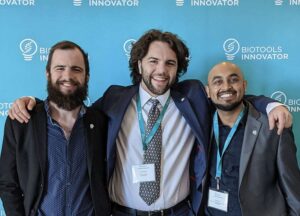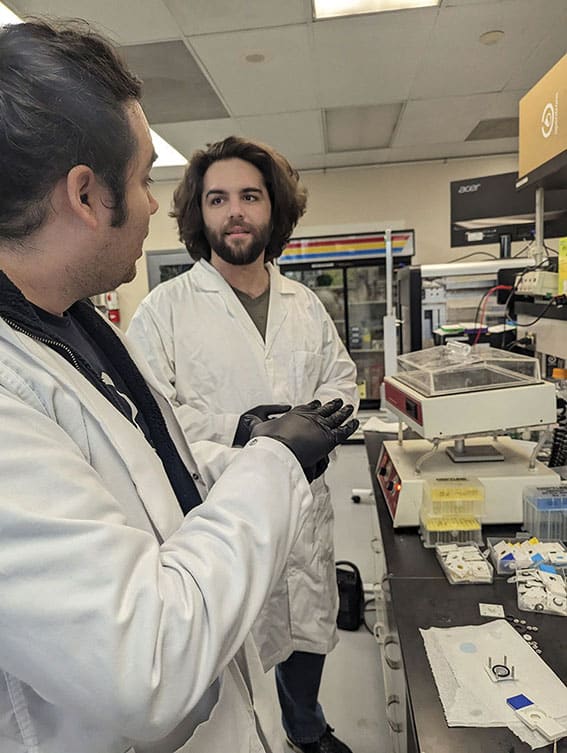
[ad_1]
By Lisa Butterworth | particular to the Courier
The co-founders of Machine Bio, a Claremont-based biotechnology startup, have gotten fairly good at innovating radical options for his or her trade right here on earth. But quickly, their know-how can be examined in less-charted territory: area. Machine Bio was lately awarded the Technology in Space Prize, which incorporates as much as $500,000 in grant funding. It additionally means their know-how, which revolutionizes protein synthesis, can be shuttled off for analysis within the U.S. National Laboratory aboard the International Space Station.

(L-R) Alex Hilbert, David Marash, and Naman Shah of Claremont biotech agency Machine Bio. Photo/courtesy of David Marash.
“We never really saw ourselves as a space company, but looking at the technology and the values it can provide, we really do see benefits there,” mentioned Alex Hilber. Hilber, David Marash, and Naman Shah based Machine Bio in 2019, when the idea of launching their work out of the environment wasn’t even a twinkle in these innovators’ eyes.
“[Receiving the award] was great validation that this technology, that started off as an idea that we shared, is now something that some of the most impactful institutions actually see as something that can be a difference maker,” mentioned Marash. “Little David, little Alex, little Naman — 20 years ago if you told any of us that our technology’s going to go up to space we’d be like, ‘Whoa, that’s crazy!’ So, it’s just got that inherent cool factor.”
In biotech, particularly the pharmaceutical trade, protein is a key product. It could be a drug —antibodies are proteins, insulin is a protein — and it may be used as a instrument to develop new sorts of medication. It will also be a part of diagnostic assessments (Marash references the COVID-19 spike protein for instance). But making protein is expensive, time consuming, and labor intensive. The typical course of takes every week or longer. First, dwell cells are coded for the actual sort of protein wanted after which grown till there are sufficient cells to place into a big bio reactor. This is the place the cells start to make the protein. But as soon as the protein is made, there are then a variety of steps wanted to take away all the impurities that the method creates.
At Machine Bio, they’re “taking the whole process and shrinking it down to a single step,” Marash mentioned. And that single step takes solely an hour. “It’s faster, it’s leaner, it’s smaller, so you can fit it on places like the International Space Station,” mentioned Marash, holding up one in every of their bio reactors, which inserts between his thumb and forefinger. Programmed DNA goes in a single facet of the reactor; the pure protein comes out the opposite.

(L-R) Aster Escalante and David Marash within the lab at Claremont biotech agency Machine Bio. Photo/courtesy of David Marash.
While the standard protein synthesis course of employs physics to filter out pure proteins, Machine Bio’s bio reactor employs the facility of biology. “The cell membrane is very, very smart. It lets specific little molecules through these little gates, so we asked ourselves, What if we build one of those gates into a synthetic membrane?” Marash mentioned, explaining the internal workings of their reactor. “This smart membrane lets us move protein from the reaction mixture to this pure compartment, with nothing else getting across.”
Though some would possibly marvel if cost-cutting improvements would merely enable pharmaceutical corporations to extend their earnings, Hilber asserts that Machine Bio’s revolutionary course of is much less about decreasing prices and extra about decreasing the limitations to innovation. “By speeding up these processes, instead of taking X amount of years to get to the market from development, you maybe cut six months or a year off of that time,” he mentioned. “Especially if it’s a particularly drastic, serious disease, then anytime you can get a drug onto the market faster, you get to help more people.”
Hilber and Marash met whereas attending Claremont’s Keck Graduate Institute, a frontrunner in biotech and healthcare training. “I met David pretty close to the beginning of our time [at KGI]. I remember I was standing in line to get our photos taken and he goes, ‘Hey, can I tell you about an idea I’ve got? Also, my name’s David,’” Hilber mentioned with amusing. “He explained the idea, and at the time it was a little more science fiction-y than science, but we developed it and by the time we graduated he had this idea for Machine Bio.”
Along with Shah, who Hilber knew from undergrad work at Arizona State University, they launched the corporate proper after commencement, renting bench area in one in every of KGI’s educating labs. In late 2021, Machine Bio employed three full-time analysis group members as effectively. Now, because of the Technology in Space Prize they obtained in February, which is funded by Boeing and the Center for the Advancement of Science in Space in partnership with nonprofit MassChallenge’s startup accelerator program, they plan to have their bio reactors area certain in 2024.
If you’re questioning why, you’re not alone. Even Machine Bio’s co-founders didn’t understand how a lot protein-based drug analysis was being accomplished in area till lately. And if their bio reactors work as efficiently on the International Space Station as they do on earth, they might assist speed up that analysis exponentially.
The microgravity of area presents a singular setting for drug analysis. An group learning most cancers medicine, as an example, might need way more success there — synthetic tumors develop extra precisely with out gravity urgent down on them, growing researchers’ means to foretell whether or not a drug goes to work. But if the experimentation requires any protein engineering, researchers have to easily wait for one more shuttle to ship proteins synthesized on earth. Machine Bio is hoping their know-how can change that, by offering the flexibility to shortly create research-ready proteins in area.
Though $500,000 might sound like a big sum, the Machine Bio founders are much more enthusiastic concerning the entry the Technology in Space Prize is offering. “The money is nice, but we’re not really seeing much of that money. Believe it or not astronauts are very expensive to pay by the hour,” Hilber mentioned with amusing. “I’m really excited about all the doors that [the prize is] opening up. Because even if you have the means to send your things to the International Space Station, it’s not like you can just hit them up and say, ‘Hey, I’m bringing my stuff over, make some room.’ This is opening the door for a whole new market and area for us to explore.”
[adinserter block=”4″]
[ad_2]
Source link